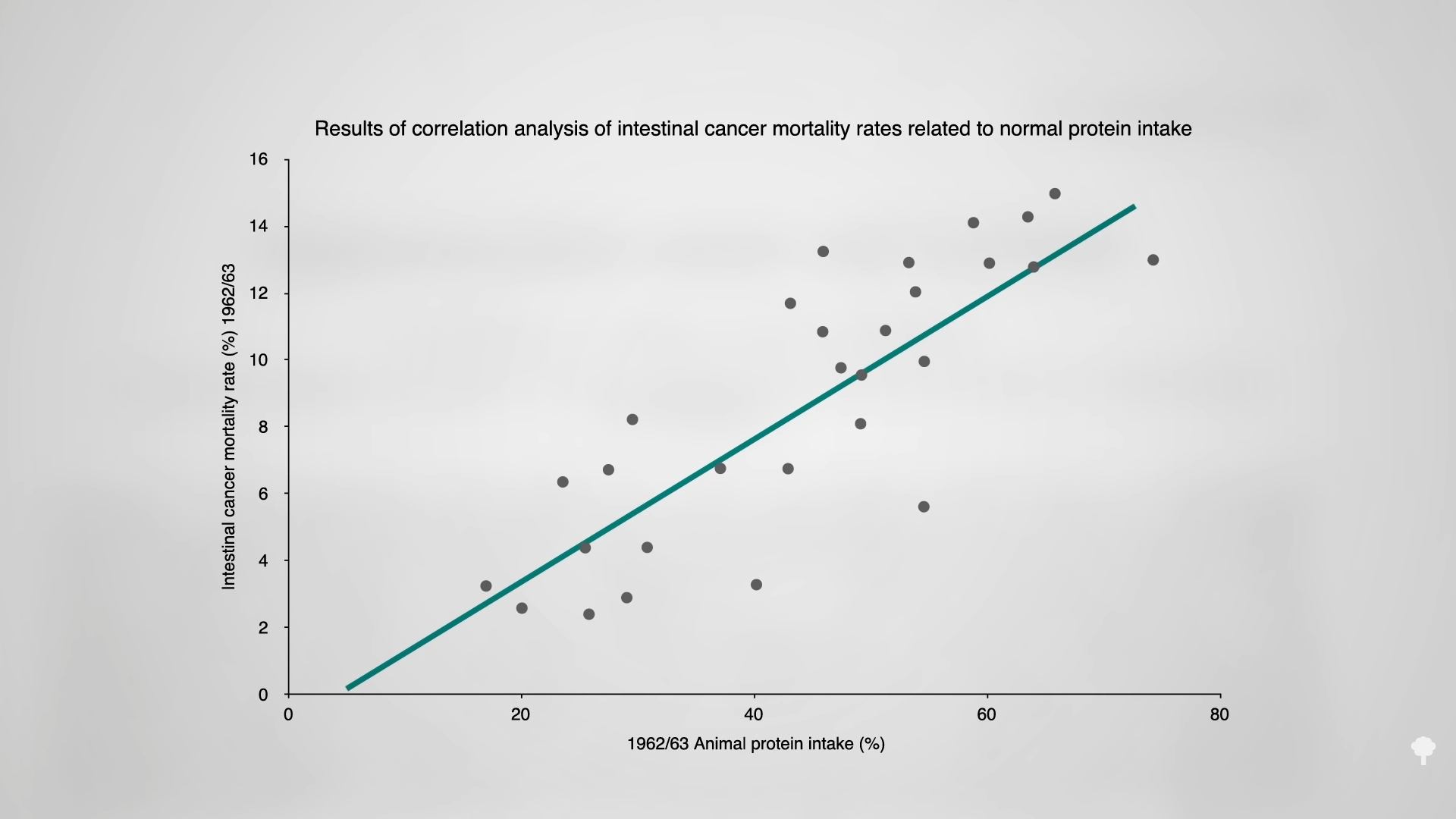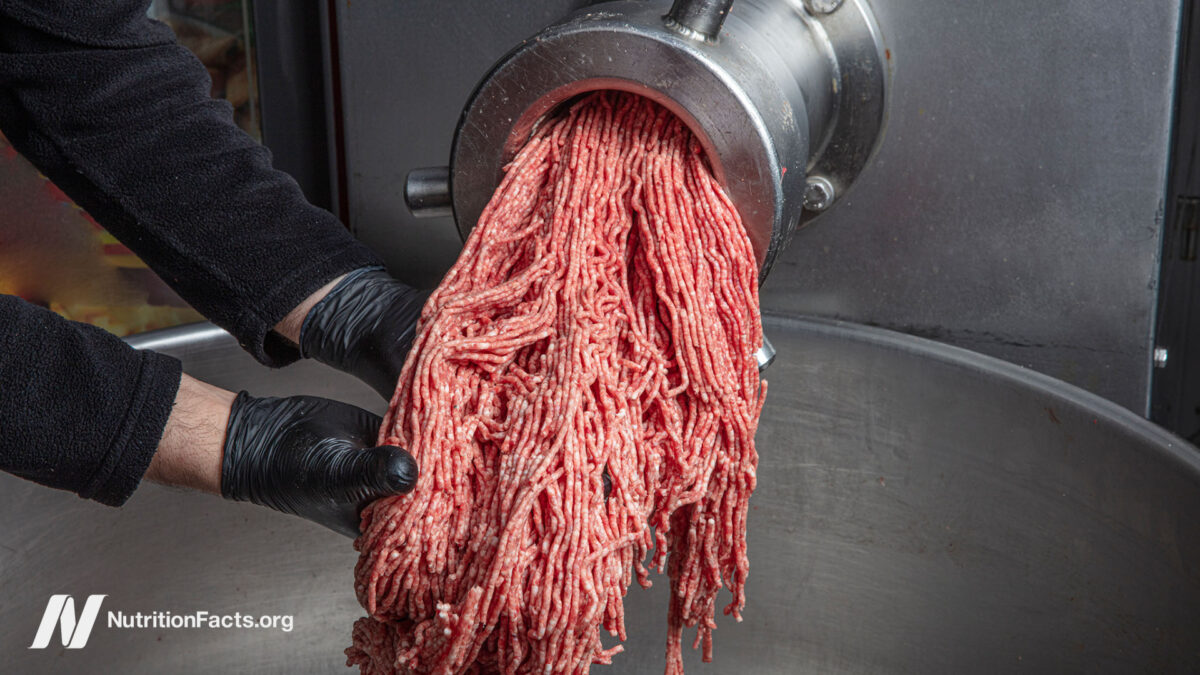What is the relationship between the consumption of eggs and other cholesterol-rich foods and cancers of the colon, breast, endometrium, pancreas, and throat?
In 1969, a correlation analysis was performed by a Dr. Gregor—no relation, and he spelled it wrong—and his colleagues. They found a rather tight correlation between animal protein intake and intestinal cancer mortality. You can see a graph of these results at 0:15 in my video Friday Favorites: Dietary Cholesterol and Cancer. In the 1970s, this relationship was extended to include breast cancer, too, and animal fat was implicated as well. Animal protein and dietary cholesterol kind of travel together in the same foods. So, it isn’t surprising that “there is significant correlation between high consumption of cholesterol-containing food items and the world-wide distribution of colon cancer.” A “large and highly significant” correlation exists, even after controlling for other dietary factors, such as animal fat and fiber, “supporting the possibility of a causal relationship between cholesterol intake and colon cancer.”

So, is dietary cholesterol co-carcinogenic for human colon cancer? Researchers decided to try to find out by feeding some to rats. In one study, researchers injected rats with a carcinogen, and the cholesterol-eating rats got tumors in half the time and they all died, whereas most of the rats in the cholesterol-free group survived. But “the relevance of animal data to the human situation is debatable.” How would the cholesterol and cancer link even work?
As humans, we don’t need to consume any cholesterol, since our body makes all that it needs. When we do consume extra cholesterol, there’s a limit to the amount our body can absorb. So, “where does the excess go?” Down to our colon. In this way, the cells lining our colon, where colon cancer arises, “are therefore constantly exposed to fecal cholesterol.” Should a cancerous or precancerous polyp arise, might all of that extra cholesterol help it grow faster? Indeed, the amount of cholesterol we eat “could thus be a factor determining the rate of development, growth, or spread of such a tumor.” Back in the 1970s, this was all just speculation, but the researchers realized that if it were true, that would be good news, since a low-cholesterol diet, cutting down on meat, dairy, eggs, and junk—the only foods that really have cholesterol—would be a “feasible, inexpensive, and without risk” way to help prevent and treat colon cancer. So, what’s the 40-year update?
Country-by-country correlation can never do more than just inspire studies like this: “the largest nationwide population-based case-control study [to date] to assess the association between cholesterol intake and several types of cancer.” The researchers found that “dietary cholesterol intake was positively associated with risk of cancers of the stomach, colon, rectum, pancreas, lung, breast (mainly postmenopausal), kidney, bladder and NHL,” non-Hodgkin’s lymphoma, or bone marrow. The flipside? “A diet low in cholesterol may play a role in the prevention of several cancers.” This means cutting down on meat, dairy, and eggs, the very foods that may increase risk of cancer.
“Thus, the findings of this study should essentially be viewed as an indication that a diet rich in meat, dairy products, eggs (and hence animal fat) is an unfavorable indicator of the risk of several common cancers…” Two cancers the study didn’t investigate, though, were endometrial cancer and throat cancer. When all of the studies on cholesterol consumption and the risk of endometrial cancer (cancer of the lining of the uterus) were put together, researchers found a dose-response, meaning more cholesterol consumption was associated with more cancer: 6 percent for every extra 100 mg of cholesterol each day. So, something like a daily omelet might increase endometrial cancer risk by about 20 percent. This may be because the extra cholesterol is converted into estrogen, or it may just be because the increased oxidative stress is reflected in higher levels of oxidized cholesterol. I talk about this in my video Oxidized Cholesterol as a Cause of Alzheimer’s Disease.
There also appears to be a dose-response relationship with pancreatic cancer, “one of the most dismal malignancies.” A compilation of studies found the risk of pancreatic cancer increased by 8 percent for every 100 mg of cholesterol, so that would be about a 30 percent higher risk for a daily omelet.
And throat cancer? Increased risk was observed by researchers for elevated cholesterol intake—about 85 percent higher odds, which is consistent with other studies. Yes, maybe it’s the oxidation, or maybe it’s the inflammation. We can’t, however, be sure the cholesterol itself is to blame. “Elevated cholesterol intake could be an indicator that a diet rich in meat, eggs, and dairy products may have unfavorable effects.”
The optimal intake of cholesterol? Zero. See Trans Fat, Saturated Fat, and Cholesterol: Tolerable Upper Intake of Zero.
